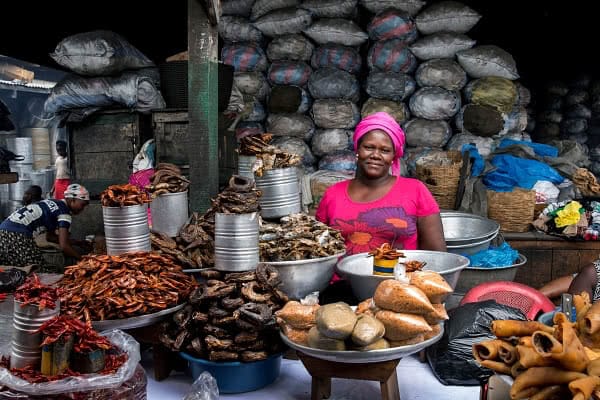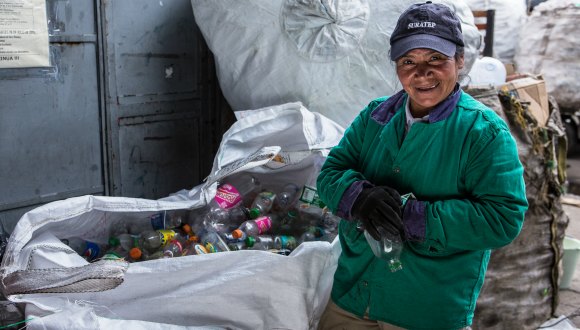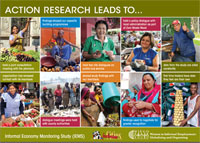
A 10-city study on three continents offered great insight into the grounded reality of waste pickers, street/market traders and home-based workers, including their contributions, challenges, and how governments and other players help and hinder their work. The study, led by WIEGO, was done in partnership with informal workers' organizations. And the results helped them leverage positive outcomes.
In-depth study into the grounded reality of informal workers
The Informal Economy Monitoring Study (IEMS) evaluates the realities that informal workers face across 10 cities (below). Qualitative and quantitative research done in 2012 combined to offer an in-depth understanding of how home-based workers, street vendors, and waste pickers are affected by economic trends, urban policies and practices, value chain dynamics, and other economic and social forces.
The study also examines contributions made by urban informal workers, their linkages to the formal economy, and which governments, institutions, and membership-based organizations help or hinder their work and lives.

- Accra (Ghana) - Street Vendors
- Ahmedabad (India) - Home-Based Workers, Street Vendors
- Bangkok (Thailand) - Home-Based Workers
- Belo Horizonte (Brazil) - Waste Pickers
- Bogota (Colombia)- Waste Pickers
- Durban (South Africa) - Street Vendors, Waste Pickers
- Lahore (Pakistan) - Home-Based Workers
- Lima (Peru) - Street Vendors
- Nakuru (Kenya) - Street Vendors, Waste Pickers
- Pune (India) - Waste Pickers
Sector Reports: Home-Based Workers | Waste Pickers | Street Traders
Find all the IEMS reports and advocacy materials.
Press release announcing IEMS findings: Study finds urban informal workers are integral to city economies but unsupported by city policies and practices (April 2014)
Impact
IEMS findings were disseminated in the 10 cities to planning authorities, institutions that impact on employment programmes, and academic institutions. Advocacy tools, based on the study's findings, were prepared for the informal worker organizations, equipping them to engage with authorities whose decisions impact the informal workers' lives and livelihoods.

This two-pager offers some of the
concrete outcomes of this action research
About the Research
The IEMS was led by WIEGO in consultation with its partners, the MBOs and support organizations who were part of the Inclusive Cities project. A Technical Advisory Committee of experts on the informal economy and on research methods provided ongoing support. Research methods were designed and honed in 2011-12, and research involving focus groups and surveys was undertaken in 2012.
City reports, sector reports and briefs were produced to showcase the research findings. Find them at at the links above.
IEMS Partners
Coordinated by WIEGO, study partners include the following organizations: Asiye eTafuleni (South Africa); Asociación de Recicladores de Bogotá (ARB) (Bogota); Consorcio de Investigación Económica y Social (CIES) (Peru); FEDEVAL (Peru); Homenet Pakistan (Pakistan); Instituto Nenuca de Desenvolvimento Sustentável de Belo Horizonte (INSEA/BH) (Brazil); Institute of Statistical, Social and Economic Research (ISSER) (Ghana); Kagad Kach Patra Kashtakari Panchayat (KKPKP) (India); Kenya National Alliance of Street Vendors and Informal Traders (KENASVIT) (Kenya); Self-Employed Women’s Association (SEWA) (India); and StreetNet Ghana Alliance (Ghana).
Leadership
Imraan Valodia directed the project from 2012-14; Sally Roever, then WIEGO's Urban Research Director (now WIEGO's International Coordinator), then became the IEMS director. Research Officers Zoe Horn and Mike Rogan provided support. WIEGO’s then International Coordinator Marty Chen chaired the IEMS Technical Advisory Committee.
Activities
In April 2012, 40 researchers and 10 MBO coordinators from the study cities underwent intensive training in research methods at a workshop in South Africa. This helped researchers learn to pilot the qualitative and quantitative methods with focus groups.
All cities conducted pilot surveys and interviews during 2012 and then began field research.
Analyzing the IEMS Data
In November 2012, 46 participants took part in a data analysis training workshop in South Africa, and worked jointly on analyzing the first round of data, . Participants worked in their city teams to begin analyzing the data collected between June-October 2012. At the conclusion of the workshop, each city team submitted their work plan to the IEMS Technical Advisory Committee (TAC). Advocacy and dissemination strategies were discussed.
Much of the focus was on how to integrate qualitative and quantitative data. Caroline Moser of the University of Manchester, special advisor to the project, and her colleagues brought their experience in participatory methods to the facilitation of the training on qualitative data analysis.
